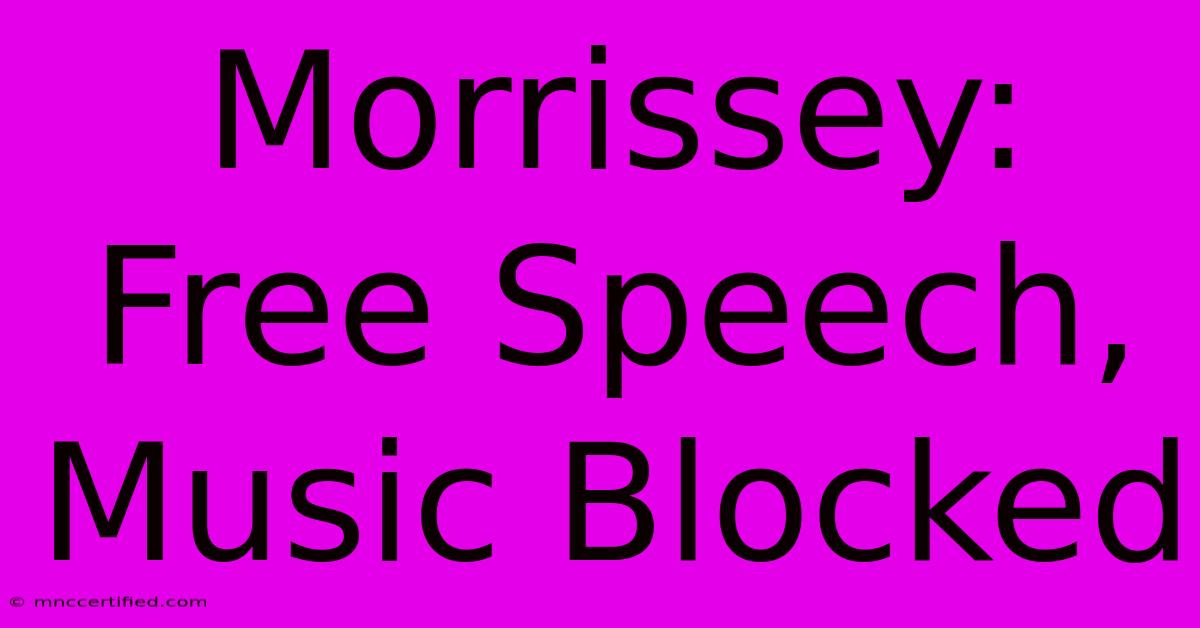Morrissey: Free Speech, Music Blocked

Table of Contents
Morrissey: Free Speech, Music Blocked – A Complex Controversy
Morrissey, the enigmatic former frontman of The Smiths, has consistently courted controversy throughout his career. However, recent events surrounding his music being blocked from various platforms have ignited a fierce debate about free speech, artistic expression, and the boundaries of acceptable public discourse. This article delves into the complexities of the situation, exploring the accusations against Morrissey, the responses from streaming services, and the broader implications for artists and platforms alike.
The Accusations and Their Fallout
Morrissey's outspoken views, often characterized as controversial and even offensive, have long been a source of contention. He's been accused of making statements perceived as racist, homophobic, and transphobic. While he claims his words are often misinterpreted or taken out of context, the cumulative effect of these pronouncements has led to a significant backlash. This backlash has manifested in several ways, including:
- Removal of Music from Streaming Platforms: Several major streaming services, including Spotify and others, have taken the step of removing or demoting Morrissey's music from their playlists and curated selections. This action represents a significant blow to his reach and income.
- Cancellation of Performances: In some cases, concerts and appearances have been cancelled or faced significant protests. The public response to his views directly impacted his ability to perform.
- Public Backlash and Condemnation: Numerous individuals, organizations, and publications have publicly condemned Morrissey's statements, calling for boycotts and greater accountability for his rhetoric.
These events underscore a crucial tension: the balance between freedom of speech and the responsibility that comes with wielding a public platform.
Free Speech vs. Responsibility
The core of the debate revolves around the principle of free speech. Many argue that Morrissey, like any artist, has the right to express his views, however controversial. They believe that censorship, even indirect forms like delisting from streaming services, is a dangerous precedent that undermines fundamental freedoms. Others counter that this freedom is not absolute and that actions and statements that incite hatred or violence should not be protected. The line between expressing unpopular opinions and propagating harmful ideologies becomes increasingly blurred in the digital age.
This isn't merely a debate about Morrissey; it's a reflection of the ongoing struggle to define acceptable discourse in an increasingly polarized world. The question becomes: where do we draw the line?
The Impact on Artists and Platforms
The Morrissey situation sets a significant precedent for both artists and streaming platforms. For artists, it raises questions about the limits of expressing controversial views and the potential consequences for their careers. It forces a crucial self-reflection on the responsibility that comes with public influence.
For platforms, the challenge lies in balancing the desire to provide a diverse range of content with the need to avoid associating themselves with hate speech or harmful ideologies. The decisions made by Spotify and other platforms are likely to influence future choices regarding content moderation and artist relationships. The challenge lies in creating consistent and transparent guidelines for content curation, avoiding accusations of censorship while protecting users from harmful material. This is a complex balancing act with potentially significant legal and ethical implications.
Navigating the Future
The debate surrounding Morrissey highlights the complex relationship between art, free speech, and social responsibility. It underscores the need for nuanced discussions about the limits of acceptable expression, the role of platforms in regulating content, and the accountability of public figures for their words and actions. Finding a solution that upholds free speech while mitigating the harm caused by hate speech remains a critical challenge for society as a whole. The future will likely see increased scrutiny of artists' public statements and evolving strategies from platforms to manage controversial content.
Keywords: Morrissey, free speech, music blocked, controversy, Spotify, streaming services, censorship, artistic expression, hate speech, public discourse, accountability, social responsibility, content moderation.

Thank you for visiting our website wich cover about Morrissey: Free Speech, Music Blocked. We hope the information provided has been useful to you. Feel free to contact us if you have any questions or need further assistance. See you next time and dont miss to bookmark.
Featured Posts
-
Singer Megan Moroney Songs And Albums
Nov 21, 2024
-
How Much Is A Pokemon Coin Worth
Nov 21, 2024
-
Burghart Rayner Pmqs Clash Explained
Nov 21, 2024
-
Westbrook Reaches 200 Triple Doubles
Nov 21, 2024
-
Iceland Volcano Eruption Flight Disruptions
Nov 21, 2024